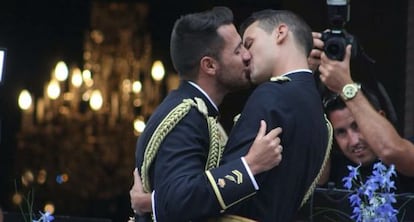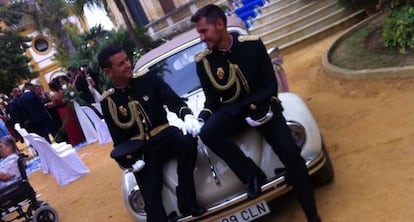Lawfully wedded – First gay union of National Police officers held in Spain
Same-sex couple hope their story will help youths struggling against prejudice at school


Two members of Spain’s National Police force got married on Saturday, marking the first same-sex union within the Spanish law enforcement agency – or at least, the first to be openly publicized.
Chema, a native of Jerez de la Frontera, and Jonathan, from Algeciras, formalized their five-year relationship in gala uniform at the Royal Andalusian School of Equestrian Art, a prominent dressage center in Jerez – akin to the Spanish Riding School in Vienna.
“We are not the first gay people in this institution, we have many friends who are also [gay] within the force,” said Chema in a radio interview on Canal Sur Radio.
We are not the first gay people in this institution, we have many friends who are also gay within the force”
Chema – which is short for José María in Spanish – said he hoped that the couple’s story would help others view gay marriage within law enforcement as normal.
Although they did not personally contact the press, word of the event got out through the social media, and newspapers such as La Voz del Sur ran a story about the wedding.
“We don’t want pictures of us in our gala uniforms because we don’t like to show ourselves off,” said Chema in that interview, adding that there should be no difference between theirs and any other wedding.

But he is happy to talk about it “if it helps children who are being bullied at school over their sexual condition to see that this is normal,” he adds.
Spain was a pioneer in same-sex marriage legislation, which Congress passed in 2005 under the Socialist administration of José Luis Rodríguez Zapatero.
The Catholic Church has long opposed homosexual unions, but Chema remains hopeful and says he would like a church wedding if Catholic officials were to change their views. The only problem would be convincing his husband, who is “agnosticism personified.”
The couple has not ruled out adopting despite feeling that there is still some social opposition to it.
“Gay parents who adopt children are stigmatized more, but people don’t think about what lies behind – the parents who abandoned their children,” says Chema. “It would seem that the gay parents who adopt a person are the bad guys, rather than the parents who abandoned that child in the first place.”
Tu suscripción se está usando en otro dispositivo
¿Quieres añadir otro usuario a tu suscripción?
Si continúas leyendo en este dispositivo, no se podrá leer en el otro.
FlechaTu suscripción se está usando en otro dispositivo y solo puedes acceder a EL PAÍS desde un dispositivo a la vez.
Si quieres compartir tu cuenta, cambia tu suscripción a la modalidad Premium, así podrás añadir otro usuario. Cada uno accederá con su propia cuenta de email, lo que os permitirá personalizar vuestra experiencia en EL PAÍS.
¿Tienes una suscripción de empresa? Accede aquí para contratar más cuentas.
En el caso de no saber quién está usando tu cuenta, te recomendamos cambiar tu contraseña aquí.
Si decides continuar compartiendo tu cuenta, este mensaje se mostrará en tu dispositivo y en el de la otra persona que está usando tu cuenta de forma indefinida, afectando a tu experiencia de lectura. Puedes consultar aquí los términos y condiciones de la suscripción digital.








































